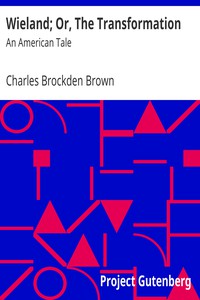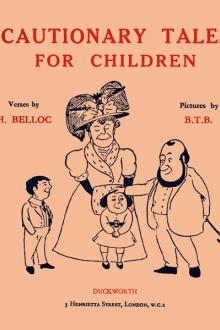Wieland; Or, The Transformation: An American Tale, Charles Brockden Brown [reading diary .txt] 📗

- Author: Charles Brockden Brown
Book online «Wieland; Or, The Transformation: An American Tale, Charles Brockden Brown [reading diary .txt] 📗». Author Charles Brockden Brown
"It was an house of mourning. His father was overwhelmed with grief, and incapable of answering his inquiries. The servants, sorrowful and mute, were equally refractory. He explored the house, and called on the names of his wife and daughter, but his summons was fruitless. At length, this new disaster was explained. Two days before his arrival, his wife's chamber was found empty. No search, however diligent and anxious, could trace her steps. No cause could be assigned for her disappearance. The mother and child had fled away together.
"New exertions were made, her chamber and cabinets were ransacked, but no vestige was found serving to inform them as to the motives of her flight, whether it had been voluntary or otherwise, and in what corner of the kingdom or of the world she was concealed. Who shall describe the sorrow and amazement of the husband? His restlessness, his vicissitudes of hope and fear, and his ultimate despair? His duty called him to America. He had been in this city, and had frequently passed the door of the house in which his wife, at that moment, resided. Her father had not remitted his exertions to elucidate this painful mystery, but they had failed. This disappointment hastened his death; in consequence of which, Louisa's father became possessor of his immense property."
This tale was a copious theme of speculation. A thousand questions were started and discussed in our domestic circle, respecting the motives that influenced Mrs. Stuart to abandon her country. It did not appear that her proceeding was involuntary. We recalled and reviewed every particular that had fallen under our own observation. By none of these were we furnished with a clue. Her conduct, after the most rigorous scrutiny, still remained an impenetrable secret. On a nearer view, Major Stuart proved himself a man of most amiable character. His attachment to Louisa appeared hourly to increase. She was no stranger to the sentiments suitable to her new character. She could not but readily embrace the scheme which was proposed to her, to return with her father to England. This scheme his regard for her induced him, however, to postpone. Some time was necessary to prepare her for so great a change and enable her to think without agony of her separation from us.
I was not without hopes of prevailing on her father entirely to relinquish this unwelcome design. Meanwhile, he pursued his travels through the southern colonies, and his daughter continued with us. Louisa and my brother frequently received letters from him, which indicated a mind of no common order. They were filled with amusing details, and profound reflections. While here, he often partook of our evening conversations at the temple; and since his departure, his correspondence had frequently supplied us with topics of discourse.
One afternoon in May, the blandness of the air, and brightness of the verdure, induced us to assemble, earlier than usual, in the temple. We females were busy at the needle, while my brother and Pleyel were bandying quotations and syllogisms. The point discussed was the merit of the oration for Cluentius, as descriptive, first, of the genius of the speaker; and, secondly, of the manners of the times. Pleyel laboured to extenuate both these species of merit, and tasked his ingenuity, to shew that the orator had embraced a bad cause; or, at least, a doubtful one. He urged, that to rely on the exaggerations of an advocate, or to make the picture of a single family a model from which to sketch the condition of a nation, was absurd. The controversy was suddenly diverted into a new channel, by a misquotation. Pleyel accused his companion of saying "polliciatur" when he should have said "polliceretur." Nothing would decide the contest, but an appeal to the volume. My brother was returning to the house for this purpose, when a servant met him with a letter from Major Stuart. He immediately returned to read it in our company.
Besides affectionate compliments to us, and paternal benedictions on Louisa, his letter contained a description of a waterfall on the Monongahela. A sudden gust of rain falling, we were compelled to remove to the house. The storm passed away, and a radiant moon-light succeeded. There was no motion to resume our seats in the temple. We therefore remained where we were, and engaged in sprightly conversation. The letter lately received naturally suggested the topic. A parallel was drawn between the cataract there described, and one which Pleyel had discovered among the Alps of Glarus. In the state of the former, some particular was mentioned, the truth of which was questionable. To settle the dispute which thence arose, it was proposed to have recourse to the letter. My brother searched for it in his pocket. It was no where to be found. At length, he remembered to have left it in the temple, and he determined to go in search of it. His wife, Pleyel, Louisa, and myself, remained where we were.
In a few minutes he returned. I was somewhat interested in the dispute, and was therefore impatient for his return; yet, as I heard him ascending the stairs, I could not but remark, that he had executed his intention with remarkable dispatch. My eyes were fixed upon him on his entrance. Methought he brought with him looks considerably different from those with which he departed. Wonder, and a slight portion of anxiety were mingled in them. His eyes seemed to be in search of some object. They passed quickly from one person to another, till they rested on his wife. She was seated in a careless attitude on the sofa, in the same spot as before. She had the same muslin in her hand, by which her attention was chiefly engrossed.
The moment he saw her, his perplexity visibly increased. He quietly seated himself, and fixing his eyes on the floor, appeared to be absorbed in meditation. These singularities suspended the inquiry which I was preparing to make respecting the letter. In a short time, the company relinquished the subject which engaged them, and directed their attention to Wieland. They thought that he only waited for a pause in the discourse, to produce the letter. The pause was uninterrupted by him. At length Pleyel said, "Well, I suppose you have found the letter."
"No," said he, without any abatement of his gravity, and looking stedfastly at his wife, "I did not mount the hill."—"Why not?"—"Catharine, have you not moved from that spot since I left the room?"—She was affected with the solemnity of his manner, and laying down her work, answered in a tone of surprise, "No; Why do you ask that question?"—His eyes were again fixed upon the floor, and he did not immediately answer. At length, he said, looking round upon us, "Is it true that Catharine did not follow me to the hill? That she did not just now enter the room?"—We assured him, with one voice, that she had not been absent for a moment, and inquired into the motive of his questions.
"Your assurances," said he, "are solemn and unanimous; and yet I must deny credit to your assertions, or disbelieve the testimony of my senses, which informed me, when I was half way up the hill, that Catharine was at the bottom."
We were confounded at this declaration. Pleyel rallied him with great levity on his behaviour. He listened to his friend with calmness, but without any relaxation of features.
"One thing," said he with emphasis, "is true; either I heard my wife's voice at the bottom of the hill, or I do not hear your voice at present."
"Truly," returned Pleyel, "it is a sad





Comments (0)